Nov 20, 2023
How Brands Can Take on Social Issues on Social Media
The way brands need to talk to consumers has changed. They have expectations of companies in terms of sustainability, transparency and the long-term benefits to society.
Companies need to communicate their values and call out issues they support on social media as part of their corporate social responsibility programs and weave them into the culture of the brand. According to ‘Championing Change in the Age of Social Media’ research, two-thirds of consumers say it’s important for brands to take a stand on social and political issues. And the place to do it? 58% are open to brands championing these causes on social media - the #1 channel for receptivity amongst consumers.
So how can brands use their social media channels, existing and new, to speak out? And if they do, what’s the best way to go about it ethically and sensitively? Let’s find out how your brand can advocate successfully on social networks.
Should brands take a stand on social issues?
It’s evident that customers now expect brands to have a purpose. There has to be something behind a brand that a consumer can believe in. Taking a stand on social issues is an effective way to demonstrate what your brand believes in and can reap rewards in these ways:
1. Boost your following especially amongst Gen Z & Millennials
A recent Gallup study found that those aged 18 to 29 are more likely to say it is “extremely important” that businesses operate in an environmentally sustainable way (77%), reduce their carbon footprint (73%) and focus on long-term social benefits. Bodyform’s ‘Womb Stories’ is a great example of a campaign that resonated. Focused on highlighting issues that affect women such as infertility, menopause and endometriosis, the animations generated a strong reaction on its social media platforms seeing 1.1 million views on Instagram and 3.4 million likes on Twitter.
(The following video by Bodyform contains a trigger warning: images of needles and portrayal of baby loss.)
Find out more about how to cater to Gen Z in your campaigns.
2. Increase revenue
Consumers expect to see a brand’s stand reflected in its business and operations as much as in its marketing.
According to ‘The New Cascade of Influence’ Edelman report, trusted brands can command a premium – with 59% of respondents agreeing that brands they trust and brands that do good in the world (55%) are worth paying more for.
This shows the power of putting your voice behind an issue that matters to your customer but more importantly, you can prove it through actions as a brand.
3. Gain trust and brand loyalty
Brands want customers that are loyal to their brand. It not only means they will return and repurchase but also spread the word to others in a way that attracts and influences them.
When brands take action on societal issues, the Edelman report found they see at least a 4x multiplier of the likelihood of purchase, while 67% of consumers are more likely to stay loyal and advocate for them.
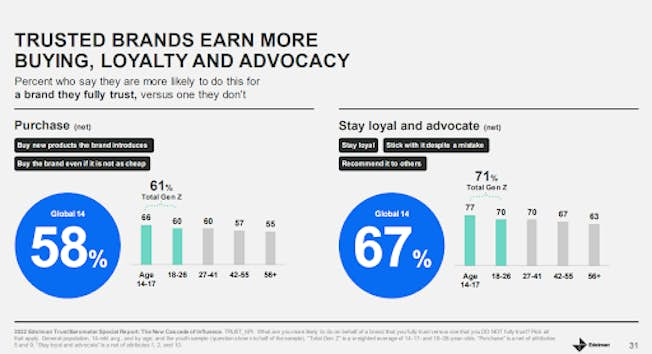
Customers expect brands to not only speak out on issues but also practice what they preach through actions such as where they do business, their supply chain and how they treat employees.
4. Raise brand awareness
With an emotive campaign that highlights an important social issue, the potential to go viral is significantly increased. When people care about a cause they want to share it far and wide.
A great example of this is LEGO, a power brand recognizable by its name and logo instantly. LEGO’s ‘Let’s Get the World Ready for Girls’ campaign aimed to fight against gender stereotypes to celebrate girls who rebuild the world.
The brand partnered with The Geena Davis Institute to research gender norms and play and found that ‘girls feel less restrained by and are less supportive of typical gender biases than boys when it comes to creative play.’
The campaign was shared across social media platforms to share and amplify the message.
5. Use your social media reach for good
If there’s a cause your brand believes in, don’t be shy about it. Authenticity is crucial in today’s world and even more so on social media. Use your networks to start a discussion about an issue that’s close to your brand’s heart.
Pledge support for a campaign that will have a positive impact on society and urge your followers to do the same. Every little bit helps, especially when it comes to charity sector campaigns and donations that can make a huge difference.
Check out 16 brands doing corporate social responsibility successfully to get an idea of what works.
When should you take a stand on social issues?
Taking a stand on social issues can have great benefits for your brand. But beware: the social issue you advocate must be something your brand genuinely cares about.
Transparency and trust are paramount to customers - 60% turn to brands they believe in. So if it turns out your stance was only to gain followers, you run the risk of damaging your reputation and bottom line. Just think Pepsi and Kendall Jenner!
Choosing the right issues is crucial to your success. Here are a few things to consider before clicking ‘post’ on your social feed:
1. Make sure you have a link to the cause
If your company is resource-intensive or you’re working to reduce waste, then sustainability could be the message you want to convey. Donations are top of the list for how customers feel brands can make a difference, so think about a cause you can back on a local or global scale.
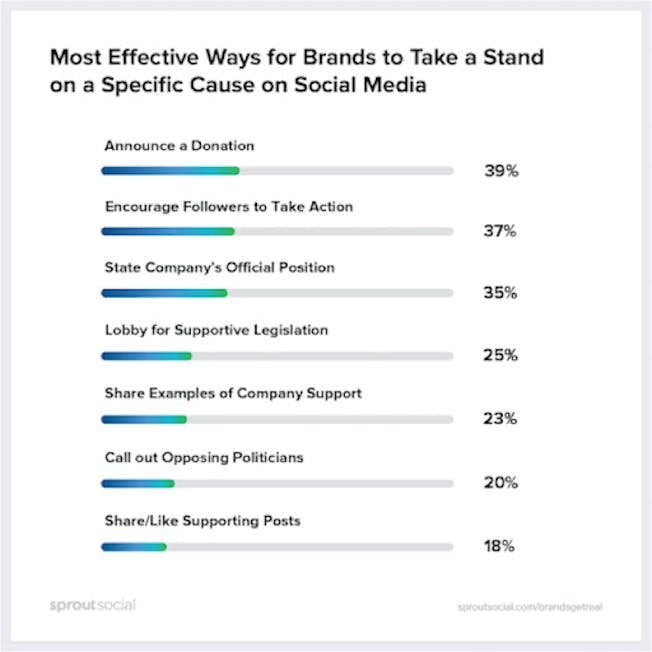
For example, Who Gives a Crap is an Australian brand that produces environmentally-friendly toilet paper that’s “good for your bum and great for the world”. Their mission is to “donate half of their profits to ensure everyone has access to clean water and a toilet within our lifetime”. To do this, they partner with charities that provide proper sanitation for millions of people in need such as WaterAid.

2. Your company culture aligns with the cause
If gender equality is a focus at your company and something you promote on social media, then there should be evidence of that within your culture. Are there initiatives that work towards narrowing the gender pay gap or maternity and paternity packages that help women return to work? Don’t get caught out by talking about an issue that’s not reflected in your own company or exclude a segment of society in your social community management.
3. You have a track record on the topic
Maybe there’s a topic or issue that you have been focusing on for years. For example, Dove’s approach to digital marketing through their Real Beauty campaign has made the brand synonymous with highlighting and appreciating real women and leaving retouching at the door. This campaign was so successful that in the first 10 years, profits jumped from $2.5 billion to $4 billion.
4. Your position will help you stand out from the crowd
During the Covid-19 pandemic a lot of brands took to social media to empathize with customers. However, this backfired for many as a Kantar Covid-19 study found that 74% of people believe that brands should not exploit the pandemic to promote a brand. So don’t adopt a cut and paste message just because others are. Take a stand by using your unique perspective and voice to stand out from the noise.
5. Consider risk vs. reward
When brands take a stand on issues using social media, the top three reactions of consumers were positive, ranging from intrigued to impressed and engaged. This trumped negative emotions and shows the power of speaking out to drive positive engagement leading to brand loyalty and inevitably sales.
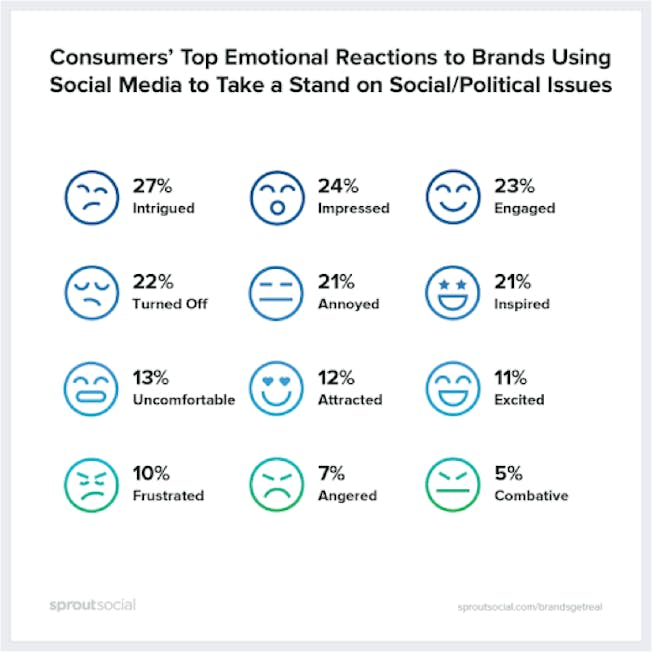
6. Not taking a stand on a key issue could be detrimental
It can happen that some issues are so significant, that a brand ignoring them can be seen as a negative. Global movements such as #MeToo and #BlackLivesMatter had such an impact on society they infiltrated culture and media. Choosing to not acknowledge them may demonstrate a brand’s lack of interest in issues that matter. According to Sprout Social’s research, the top four issues that consumers want brands to take a stand on are human rights, poverty, environment, and education.
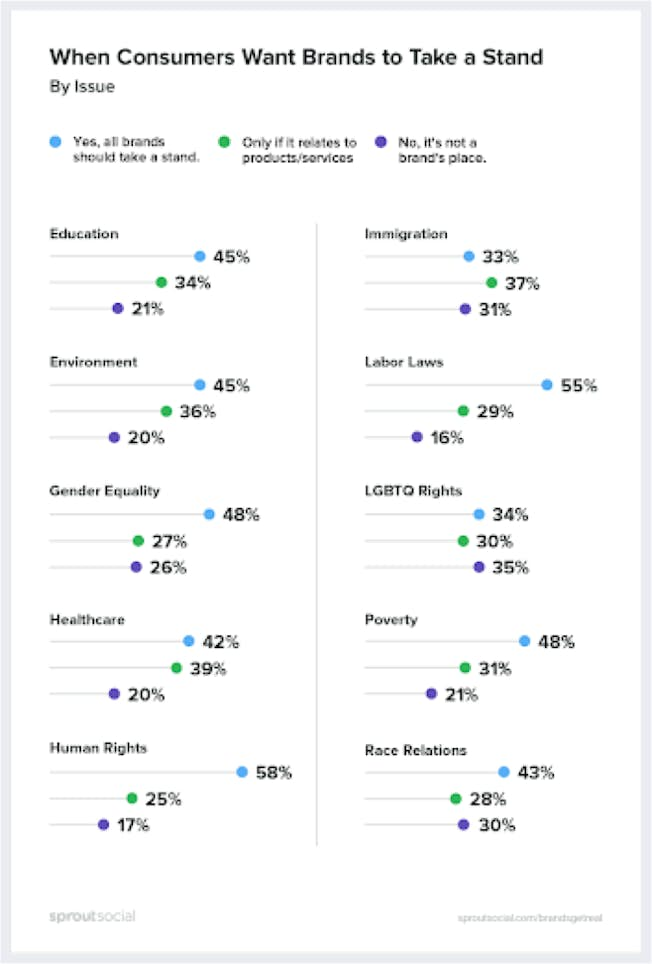
How do you use social media to champion social issues?
Social media is an important tool for supporting and commenting on social issues. But there’s a skill to use the platforms effectively.
1. Listen to your customers
Before you take to social media to advocate on a topic, take time to listen. When activism happens around a social cause, emotions can run high. During the BlackLivesMatter protests, the sentiments expressed on Twitter were fear, anger, joy and sadness. To understand your audience, use the best audience listening tools to gauge the mood. This will allow you to turn a negative emotion into a positive action such as urging followers to sign a petition or purchase a product that supports the cause.
2. Do your research
Make sure you know what you’re talking about before you talk about it! This may sound simplistic, but any assertions you post should be backed up with evidence from reputable sources. Look to experts and reach out to well-known organizations in the area in which you want to take a stand to ensure you are educated. Also, ensure you have a social media style guide that provides a roadmap for all employees active on your channels to ensure your brand’s voice is consistent.
3. Choose the right platform
Facebook’s audience is not the same as TikTok’s. Look at the social platforms you use and see which ones would fit best for the type of message you want to convey. Also, think about content formats. Would a video work better and if so on which network? Or is a quality blog or guest post the best way to get your message across? You don’t need to use every network just because they are there.
Hashtag campaigns on social media can be very successful. One that’s well thought out will help drive brand awareness, boost retweets and followers and encourage audience engagement.
The secret to a good hashtag? Make sure it’s original, clear and catchy. There are some great tools you can use to find the best one for your brand. Here are a few examples of top brand hashtags for social issues on Twitter:
- #IceBucketChallenge - A campaign to promote ALS, this hashtag went viral making it impossible to avoid seeing someone being doused with cold water when logging into Twitter!
- #BringBackOurGirls - Created to campaign for the return of school girls kidnapped from a school in Nigeria, the hashtag went viral reaching 6.1 million users.
- #MeToo - Originally posted by Alyssa Milano, this hashtag pinged its way across the globe in support of those who had been affected by sexual harassment. It gathered such momentum that it prompted 19 million tweets.
4. Be clear with your message
Customers value and respect authenticity. A brand campaign for a social issue won’t work if people sense something half hearted. A well-crafted press release is not what they want to see on social media. Be clear about what you want to say, be human and most of all be honest. Patagonia is a great example of a brand that has no issue being very clear on where it stands in terms of climate change and asking people to take action.
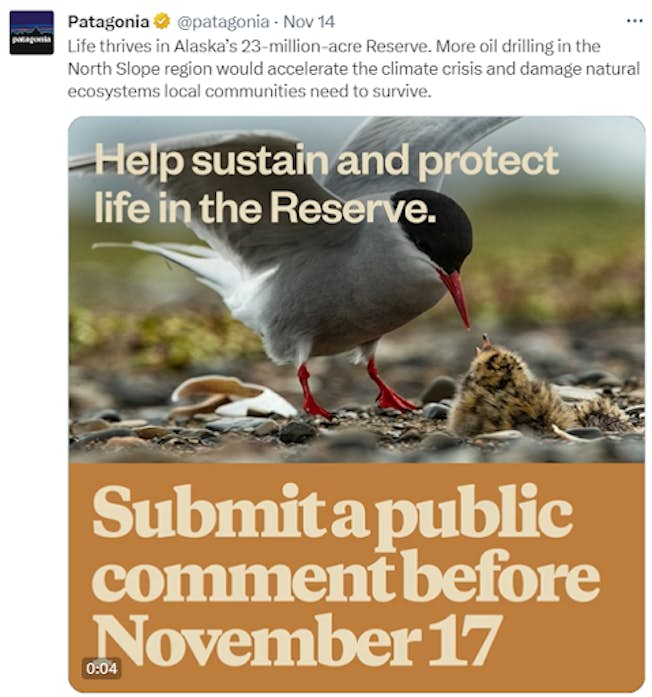
5. Be well-prepared & trained
Taking a stand on social media can be daunting even for global brands with experienced marketing teams especially if it’s in the face of a social media crisis. So, if you’re a digital marketer looking to get your brand’s voice heard, you may need some help to get there. The secret to successful social media activism is understanding the fundamentals and knowing the tools that can help you master listening and engagement.
Updated 2023
Ensure Success with the Best Social Media Marketing Course!
A course in social media marketing will help you develop expertise and gain an in-depth understanding of social research, strategy and content along with the unique features of each social platform. Enroll in DMI’s certified Social Media Marketing course today to learn from the best to become the best.
Related
Upgrade to Power Membership to continue
your access to thousands of articles, toolkits, podcasts, lessons and much much more.
Become a Power Member- Login
- View Courses
- - - -
- Courses
- Resources
- - - -
- My Account
- Change Password
- Logout





